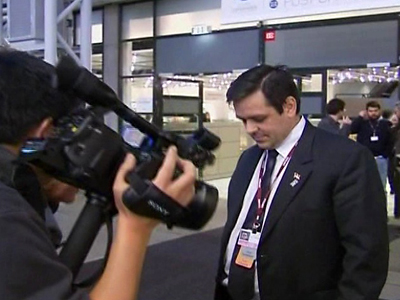
Copenhagen: Global Heat over Disappointing Climate Deal

What’s being called the Copenhagen Accord on climate change has unleashed a wave of anger.
A deal hammered out by the U.S., China, South Africa, Brazil and India has done little to please anyone else.
Many environment campaigners singled out President Barack Obama.
[Bill McKinnon, Head of 350.Org NGO]:
„In essence Obama said we’re not going to use the U.N. to deal with energy and global warming. We’re just going to take big polluters and ’solve‘ the problem amongst ourselves.
[Erich Pica, President of Friends of the Earth]:
„[What this agreement is], is just something for the United States to take home and say ‚we accomplished something‘.“
The deal aims to keep future global warming below two degrees Celsius.
It pledges 100 billion dollars a year by 2020 to help developing nations.
But the accord is not legally binding and that’s disappointed groups like the European Union.
[Jose Manuel Barroso, European Commission President]:
„This accord is better than no accord. This was a positive step but clearly below our ambition.“
Opponents including the G77 group of African nations have branded the accord the worst in climate change history.
Representatives of low-lying states like Tuvalu were equally outspoken
[Ian Fry, Delegate for Tuvalu]:
„I regret to inform you that Tuvalu cannot accept this document.“
China’s top climate negotiator told national reporters all parties should be happy but wasn’t keen to talk to anyone else.
Beijing is widely blamed for watering down the deal.
Obama has arrived home to a snowstorm and the heat from the climate conference not far behind.
The Copenhagen accord would need unanimous backing to become a U.N. pact.
Without that it would be adopted only by its supporters, far short of what many had hoped for the first climate agreement in over a decade.
 (NTDTV)
(NTDTV)


![SPD-Bundesparteitag: Reden von Scholz und Klingbeil zur bevorstehenden Wahl [Livestream]](https://images-de.epochtimes.de/uploads/2025/01/Thumb-SPD-Bundesparteitag-v2-400x225.jpg)
























vielen Dank, dass Sie unseren Kommentar-Bereich nutzen.
Bitte verzichten Sie auf Unterstellungen, Schimpfworte, aggressive Formulierungen und Werbe-Links. Solche Kommentare werden wir nicht veröffentlichen. Dies umfasst ebenso abschweifende Kommentare, die keinen konkreten Bezug zum jeweiligen Artikel haben. Viele Kommentare waren bisher schon anregend und auf die Themen bezogen. Wir bitten Sie um eine Qualität, die den Artikeln entspricht, so haben wir alle etwas davon.
Da wir die Verantwortung für jeden veröffentlichten Kommentar tragen, geben wir Kommentare erst nach einer Prüfung frei. Je nach Aufkommen kann es deswegen zu zeitlichen Verzögerungen kommen.
Ihre Epoch Times - Redaktion